V Nutrition is reader-supported. When you buy through links on our site, we may earn a commission. Learn more.

Verified by: Stacey Simon, RD
Fact-checker: Nicolette Maggiolo, RD, LDN
Navigating the path to peak wellness is more accessible than ever, with a staggering 90% of Americans using digital health tools. Amidst this digital revolution, online nutritionist services have flourished, offering personalized dietary guidance at your fingertips. This guide meticulously assesses the best online nutritionists, drawing from a pool where over 77% of users report satisfaction with telehealth nutrition services, according to a study in the Journal of Telemedicine and Telecare.
In this article, we rank top-tier platforms to ensure you connect with a nutrition expert who aligns with your health aspirations, providing a resource that's not only informed by expertise but also shaped by the real-world success of individuals like you.
A Quick Look at the Best Online Nutritionists
- Best Overall: Top Nutrition Coaching
- Best Self-Guided: Noom
- Best for Weight Loss: Top Nutrition Coaching
- Best for Eating Disorders: Equip Health
- Best for Children & Families: Lemond
- Best on a Budget: Amwell
- Best Group Classes: On-Point Nutrition
- Best for General Wellness: Culina
- Best Customer Support: On-Point Nutrition
- Best for Athletes: Forge
- Best Flexibility: Eleat Nutrition
Our Top 3 Picks For Best Online Nutritionist Services
We reviewed every service across 14 different factors and identified the best ones.
| Factors Analyzed | Top Nutrition Coaching | OnPoint Nutrition | Amwell |
|---|---|---|---|
| Free introduction session with a dietitian | Yes. Claim now. | No | No |
| Virtual | All sessions are virtual | All sessions are virtual | All sessions are virtual |
| Price | $65-75 session. | $200-1000+. Pay in installments. | $70/session. |
| Registered Dietitians | Only works with registered dietitians. Only accepts the best. Less than 1.7% acceptance rate for dietitians who apply. | Accepts dietitians & nutritionists. | Only works with registered dietitians. |
| Specialists (Weight Loss, Diabetes, etc) | Experts across every area of nutrition (weight loss, intuitive eating, sports performance, and much more). | No | No |
| Personalized Matching Process | Free 15 minute call with trained matching specialists who handpick the right expert based on your needs and goals. See available times. | Team of 12 dietitians. You'll get paired with one of them. | Choose from their list of hundreds of providers. |
| Unlimited Messaging | Yes | Yes | No |
| Customized Nutrition Plans | Yes | Yes | No |
| Sustainable Approach | Yes | Yes | Depends on the provider |
| Flexible Scheduling | Sessions are available Monday-Sunday from 7am-10pm. | Sessions are available Monday-Friday 8:00am-5:30pm EST. | Depends on the provider |
| Mobile App | Yes | No | No |
| HSA/FSA | Yes | Yes | Yes |
| Satisfaction Guarantee | Risk free trial. Pay only if satisfied. Learn more about risk free trial. | No | No |
| Customer Support Team | Dedicated nutrition concierge ready to help you 24/7 with any questions, navigating the platform, and more. | Yes. Two team member's focused on customer support 9-5pm. | Yes. Only open during certain times/hours. Response time not high. |
In an increasingly health-conscious world, trying to keep up with the latest nutrition discoveries, fitness trends, or problematic food groups can often feel impossible. And, whether it’s the anxiety of living in a post-pandemic timeline or the more familiar stress of day-to-day life, your health and the health of your family are more important than ever.
Previously, anyone wanting to improve their eating habits would spend days or even weeks scouring the internet, struggling to distinguish between useful advice, dated information, and outright scams. Today, however, resources exist to help navigate the labyrinth that is the world of nutrition. Specifically, online nutrition counseling companies can serve as a lifeline for those feeling lost. These services provide dedicated nutritionists, comprehensive meal planning, and educational resources to help guide clients toward better health outcomes.
If you're interested in online nutrition counseling but need help figuring out where to start, you should first learn how the online nutritionist industry operates. To help you in your health journey, we've conducted a comprehensive review of the best online nutritionist programs, the nutrition specialty you might need, and a complete guide on how to determine whether a nutrition coach is right for you.
Below are our 2023 choices for the top online nutritionists available. The companies listed offer the best value, best results, and most stress-free experience. We've also outlined the strengths and weaknesses of each service so you can make an informed decision.
1. Top Nutrition Coaching
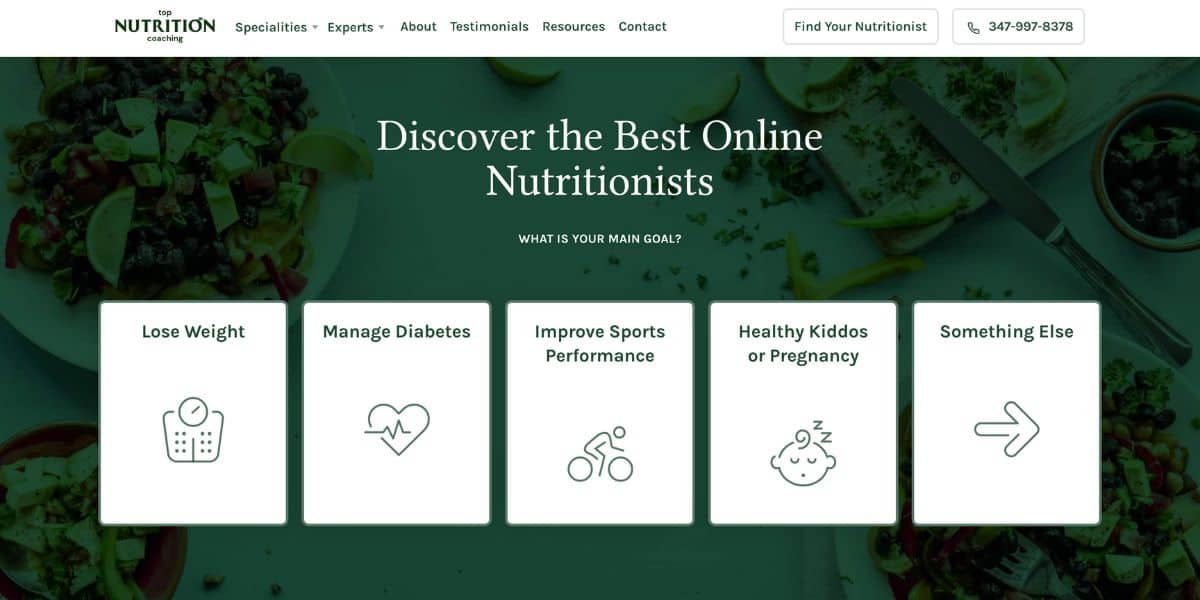
In an industry full of knowledgeable, compassionate professionals, it may seem challenging for a single nutrition coaching company to stand out. Despite this, Top Nutrition Coaching does just that.
With a diverse team of dietitians and nutritionists, Top Nutrition Coaching caters to clients of all backgrounds. Whether a client requires assistance with managing the symptoms of a chronic illness, fitness coaching, pediatric nutrition, or pregnancy health, Top Nutrition Coaching can find the best online nutritionist for you.
In fact, the company's performance standards for its nutritionists and dietitians are so high they only hire the top 1.7% of nutrition professionals. To maintain this impressive standard, Top Nutrition Coaching has implemented a rigorous training and development system aimed at elevating their nutritionists’ skills, expertise, and knowledge to the highest levels in the industry.
Because of their research into the “working alliance”–a collaborative partnership between a nutritionist and their client–Top Nutrition Coaching recognizes the enormous value that a premium matching service provides. Unlike other companies which put little thought into this aspect of their services, Top Nutrition Coaching trains its team of matching specialists to identify exactly the right nutritionist for each client. By factoring in coaching style, background, expertise, and the client’s needs, this team maximizes every customer’s potential for success.
Pros
- Free, Personalized Matching Process: Unlike other online counseling programs, Top Nutrition Coaching maintains a dedicated team of matching specialists whose sole responsibility is to pair you with the best dietitian for you.
- Flexible Scheduling: Top Nutrition Coaching's large pool of nutritionists and dietitians means you can find someone who’s available when you are.
- 24/7 Access: With the promise of round-the-clock accessibility, Top Nutrition Coaching allows customers to communicate with their matched nutritionist when they need–not only during pre-planned appointments.
- Excellent Value: Nutrition counseling can be expensive, but Top Nutrition Coaching provides a variety of packages to offer value at every price point. No matter how much or how little guidance you need, this company gives you the highest return on investment in the industry.
- Highly Personalized Counseling Experience: Your needs are unique, so your nutrition coaching should be, too. Top Nutrition Coaching personalizes each client’s plan to suit their requirements, from the recipes in their meal plan to the personality of their coach.
- Sustainable, Evidence-Based Approach: The nutrition industry sometimes uses outdated metrics and questionable science, which is why Top Nutrition Coaching focuses on sustainable, evidenced-based research to build its programs.
- Community of Experts: Through their prioritization of a premium, industry-leading nutrition coaching program, Top Nutrition Coaching has cultivated a community of experts passionate about providing the best service possible.
- Best Dietitians in the Industry: Top Nutrition Coaching only partners with certified dietitians. They also promote internal reviews to ensure all online nutrition coaches meet their standards for client satisfaction.
Cons
- 6-Session Minimum: Although the service allows you to schedule your coaching whenever you'd like, they only offer packages with 12 virtual sessions.
- Limited Availability With Matching Specialists: Because of their dedication to providing only the best nutritionists in the industry, some of Top Nutrition Coaching’s matching specialists may have limited availability.
Bottom Line: Even among outstanding competitors, Top Nutrition Coaching's diverse team of specialists, intuitive matching system, and dedication to high-quality nutrition counseling make them our top pick. Top Nutrition Coaching is a great investment for anyone looking to get back in control of their health and reach their goals.
2. Eleat Nutrition
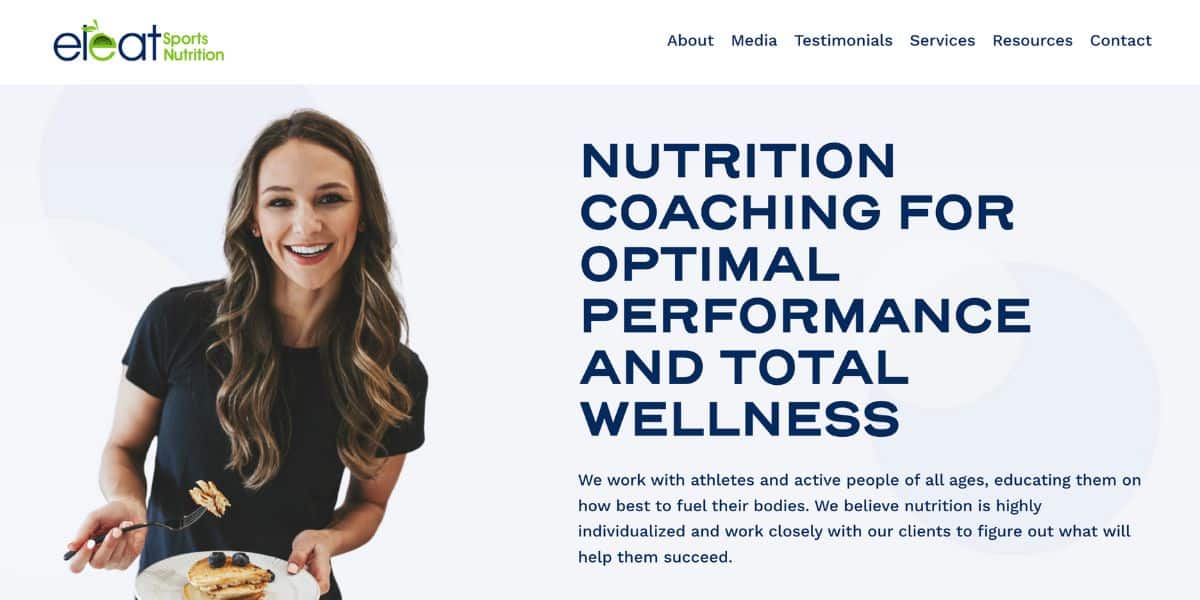
First founded in 2014 by dietitian and sports coach Angie Asche, Eleat Nutrition is an athlete-centric virtual nutrition service that prioritizes flexibility and ease of use. Even though Angie and her nutritionists focus mostly on sports nutrition, personal training, and injury recovery programs, they also offer services for people who want to improve their overall health.
The most impressive thing about Eleat Nutrition is how flexible and easy to understand their packages are. While scheduling sessions may be a stressful experience with other coaching services, Eleat Nutrition allows clients to choose whether to meet weekly, monthly, or on any other timeline. This flexibility reduces stress by allowing clients to work on their health goals at their own pace. Also, Eleat Nutrition does not require a minimum number of sessions for any of their packages.
At this time, Eleat Nutrition does not have clear pricing information on its website. Potential clients may request more information and a quote. Remember that due to their limited team and high demand, Eleat Nutrition often has an active waiting list.
Pros
- In-Person or Virtual sessions: Unlike other purely virtual nutrition programs, Eleat Nutrition still allows their customers to meet with some coaches if they choose to or blend virtual and in-person sessions to best suit the client's schedule.
- Excellent Program Flexibility: Eleat Nutrition designs online nutrition counseling that prioritizes customization, allowing clients to pick and choose which classes and services they want most and which they'd rather skip.
- No Minimum Program Length: Although online nutrition counseling mandates a certain number of sessions with their coaches, Eleat Nutrition allows you to pay for as few or as many check-ins as you'd like.
Cons
- Does Not Accept Insurance: Despite their impressively flexible programming, Eleat Nutrition does not currently accept health care. Clients may submit receipts to their provider independently, but coverage is not guaranteed.
- Vague Pricing Information: At the time of writing, Eleat's website contains only loose, insufficient information about their pricing format and package costs. Potential clients must schedule a meeting with a representative to learn more.
- Waitlist for New Clients: Due to either their popularity or the small size of their team, Eleat Nutrition has maintained a strict waiting list since January 2022. New clients will likely have to wait before finding their nutritionist.
Bottom Line: Eleat Nutrition’s customizable online nutrition programs, flexible scheduling, and broad wellness expertise make it our top pick for those of you who may have busy schedules and uncertain availability.
3. OnPoint Nutrition
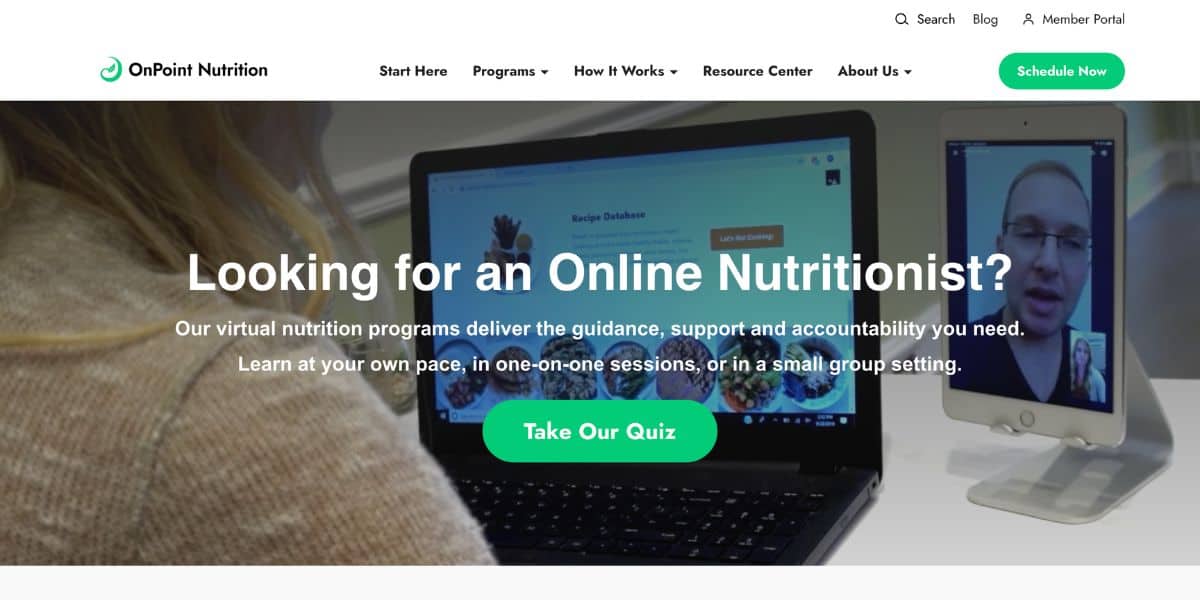
A respected and widely available coaching service, OnPoint Nutrition offers a range of programs to address various food-related issues and specializes in treating and managing certain chronic illnesses such as GI disorders and polycystic ovarian syndrome.
OnPoint Nutrition's most impressive quality is their comprehensive suite of tools and resources, all designed to help clients reach their goals and track progress. These tools include an app to help track food intake, an extensive recipe library, and a 24-hour messaging service for clients to contact their coaches.
Although OnPoint offers a range of nutritionists with diverse specialties, it is not immediately clear from their website if clients can choose their own nutritionist or dietitian. Even though this is the case, the service does offer a free consultation where you can ask questions and look at different programming options.
At the moment, OnPoint doesn't share pricing information with the public, but potential customers can find out more during a consultation. However, OnPoint is in-network with many large insurance providers, a quality that may aid those looking for more affordable online nutritionist counseling options.
Pros
- Excellent Customer Support: With their intuitive online communication platform, OnPoint Nutrition maintains a 24-hour customer service line to ensure that clients can get the answers they need when they need them.
- Free Initial Consultation: When you begin your journey with OnPoint Nutrition, they'll schedule a free, action-oriented consultation to assess your needs, nutrition-related concerns, and overall health goals.
- Phone App Support: OnPoint Nutrition maintains a custom-built suite of useful tools and applications to help you stay in touch, stay motivated, and stay on top of your online nutrition counseling goals.
Cons
- Hires Unregistered Nutritionists: Although customer feedback is generally excellent for this company, they include unregistered nutritionists in their network of health professionals. While this isn't necessarily a risk, it does decrease the level of oversight and required standards for their team.
- Few Package Options: While OnPoint Nutrition's packages are comprehensive and intelligently designed, customers may find the variety lacking. Those looking for a more customizable, personalized experience may struggle with this.
Bottom Line: If communication and 24/7 customer support are qualities you value in a company, OnPoint is the service you need to help you stay on track.
4. Tepper Nutrition

Tepper Nutrition is an expert, comprehensive nutrition service that only partners with registered dietitians. Because of this, the company maintains a small but highly competent team with experience in an impressive range of specialties. Also, Tepper Nutrition talks about how much they love "intuitive eating," which is different from traditional dieting and something that many of their clients prefer.
Because of the broad experience of their relatively small team, Tepper Nutrition can handle many specific food-related conditions, such as medical nutrition therapy for diabetes, PCOS, heart health, GI disorders, and more.
Potential clients are encouraged to schedule a free, 15-minute consultation, during which they'll speak with a Tepper Nutrition representative and establish a clear set of main goals. If, after this call, a client decides to move forward with the process, they'll be matched with a dietitian for a more thorough assessment. For communication, Tepper Nutrition allows email contact and conversations via its website portal, but no texting or third-party applications.
At the moment, Tepper Nutrition is not in network with any insurance companies. However, they have a flexible payment system for people on a budget.
Pros
- Only Hires Registered Dietitians: Tepper Nutrition sources its nutrition experts from only high-quality sources, requiring each coach to register with and abide by the Commission on Dietetic Registration standards.
- Flexible Pricing: Despite the high quality of their offerings, Tepper Nutrition incorporates a flexible pricing model into their packages, allowing you to tailor your care to fit your budget.
- Free Initial Consultation: With a complimentary consultation designed to assess your needs and match you to potential coaches, Tepper Nutrition helps set you up for success.
Cons
- Out of Network for Insurance Coverage: While it may be possible to have a portion of Tepper Nutrition's fees covered by your health insurance, it will likely be a smaller portion than might be covered at other in-network organizations.
- May Lack Specialty Knowledge: Although customer reviews are generally favorable, Tepper Nutrition's small, limited team may struggle to address particular concerns and specialties outside their experience.
Bottom Line: Tepper Nutrition's extensive course offerings and dedication to education help you take control of your fitness journey, teaching you the skills you need to become your own coach.
5. Lemond Nutrition

Based out of Texas but offering services in an impressive number of states, Lemond Nutrition is a nutrition counseling service with a strong focus on pediatric nutrition and family care. Although they provide nutrition and fitness services, they specialize in weight-neutral programming that puts health before the number on a scale. Many of their clients highly value this inclusive approach to maintaining a healthy weight and often prefer it over traditional, low-calorie-centric dieting.
A unique quality of Lemond Nutrition is their family-oriented packages, which offer nutrition counseling for up to four family members. Though technically a group package, this service provides individual, personalized meal planning for each family member to help them reach optimal health.
Lemond Nutrition has a custom-built mobile app that clients can use to talk to their coaches and keep track of their progress. Outside of the app, the company also offers virtual consultations with flexible scheduling options.
Currently, Lemond Nutrition accepts several major insurance carriers. Because they don't work in some states, potential customers should check ahead of time to see if their insurance is accepted.
Pros
- Excellent Pediatric Nutrition Counseling: Lemond Nutrition's most impressive area of expertise is in pediatric nutrition counseling, where they are among industry leaders in both experience and care. If you're seeking assistance with your child's nutrition, Lemond Nutrition can help.
- Inclusive to All Backgrounds: With a strong focus on compassionate, inclusive care, Lemond's approach to nutrition coaching may be the perfect fit for those with doubts or worries about their ability to follow a program.
- Prioritizes Weight-Neutral Counseling: Although many clients seek out nutritionists for help with weight loss, Lemond Nutrition prioritizes a weight-neutral approach to nutrition counseling. This difference makes them an excellent service for those uncomfortable with traditional diet-centric coaching.
Cons
- Limited Availability in Certain States: Although extremely popular in their areas of operation, Lemond Nutrition's availability does vary depending on your state. Before engaging their services, ensure they're certified to operate in your area.
- Less Expertise in Non-Family-Related Nutrition: While Lemond Nutrition offers pediatric nutrition coaching second to none in the industry, clients looking for experience in other areas of specialty may find more success elsewhere.
Bottom Line: Only the best will do when it comes to your family's health. Lemond Nutrition's dedication to pediatric expertise and compassionate coaching make them an outstanding choice for your family's nutrition needs.
6. Anderson's Nutrition
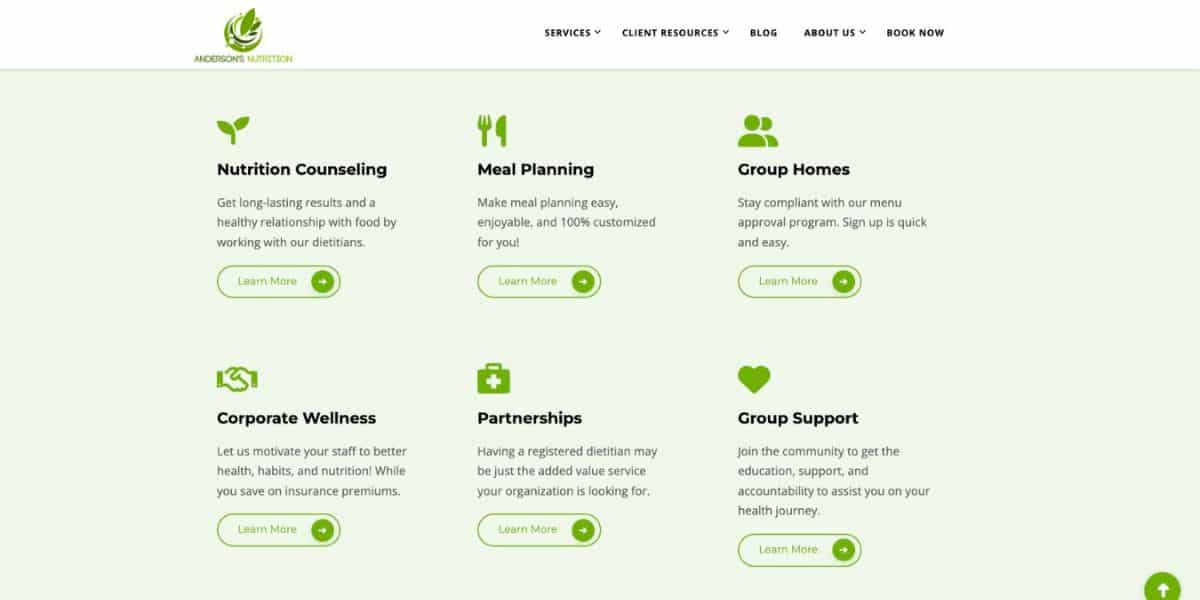
Anderson's Nutrition is a full-service online nutrition counseling service that helps its clients live better lives by offering affordable package options and a wide range of resources. Although most companies in the nutrition industry offer meal planning, Anderson's Nutrition takes this particular service to the next level.
Once a client is given a dietitian, they work with them to come up with a personalized meal plan and tasty foods that help them reach their goals. Additionally, Anderson's Nutrition maintains and regularly updates an enormous, curated recipe library from which clients can take inspiration or entire recipes. Their partner app, EatLove, also has a grocery function to help you make smart shopping decisions.
Anderson's Nutrition doesn't support all types of nutrition specialties, but it has a lot of flexibility when it comes to programs and schedules. Unlike most companies in the space, they allow clients to schedule appointments on weekends and evenings. The company also supports Spanish-speaking clientele.
Finally, insurance is accepted at Anderson's Nutrition, and their representatives are more than happy to work with clients to navigate out-of-network coverage.
Pros
- In-Person Sessions Available: While the majority of clients prefer virtual nutrition counseling for its flexibility, Anderson Nutrition also offers face-to-face sessions for those preferring a more traditional approach
- Flexible Session Timing: With appointments available on weekdays, weekends, and evenings, Anderson's Nutrition allows you to schedule your sessions whenever you'd like, reducing headaches and freeing up your days to enjoy the benefits of your new health.
- Extensive Recipe Library: Even more than some competitors, Anderson Nutrition's extensive recipe library allows you and your coach to design an easy, delicious meal plan based on the foods you enjoy most.
Cons
- Uses External Apps for Communication: Anderson's Nutrition requires clients to download and install several external applications and tools to communicate with their nutrition coaches and track progress.
- More Expensive Primary Package: Though they undoubtedly offer high-quality, comprehensive service, Anderson's Nutrition's primary care package is considerably more expensive than some competing nutrition counseling services.
Bottom Line: If you're looking for a top-of-the-line, custom meal plan to fit your nutrition goals, Anderson's Nutrition's extensive recipe library and handy companion app make them one of the best in the business.
7. Noom
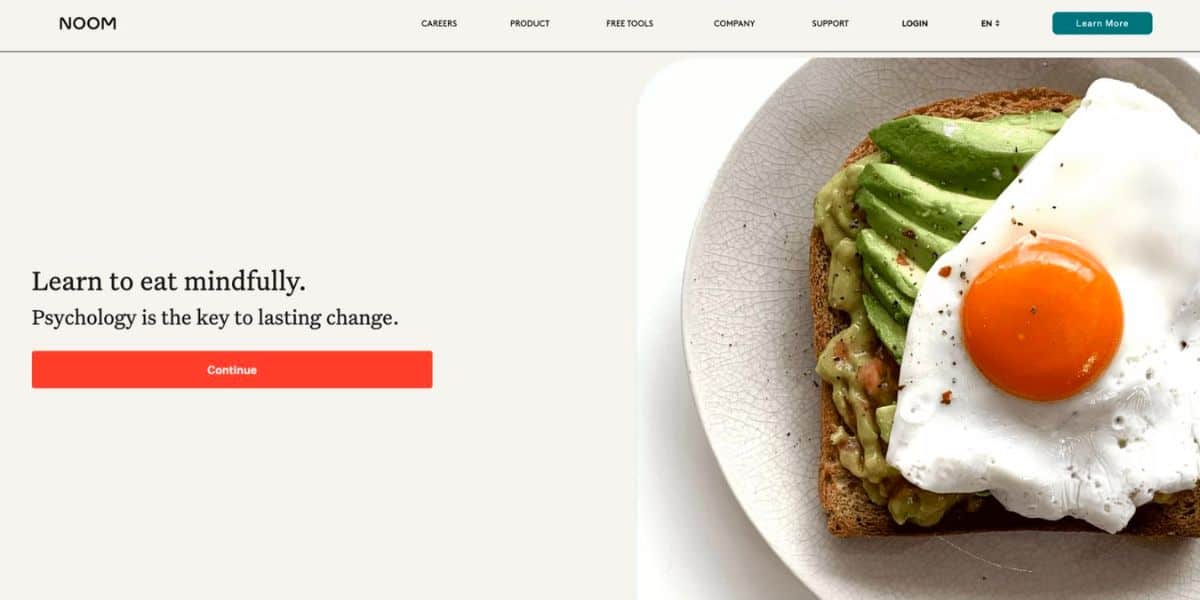
A streamlined, straightforward nutrition coaching company that uses a custom-built app to provide services, Noom is unlike many of the other selections on this list. By combining modern behavioral therapy techniques with digital resources, Noom allows customers to build healthy, sustainable habits by simply following the instructions given via their app. While the bulk of this service involves a manufactured nutrition and meal plan, Noom subscribers may also communicate with a team of nutritionists to answer questions or address concerns.
At $70.00 a month, Noom’s bottom price point is less than that of many other services. Despite this, it’s important to note that Noom provides a more bare-bones approach to nutrition. While this may be preferable for those seeking a casual approach to their health and nutrition journey, customers who prefer more structure and guidance may find more success with another company.
Nonetheless, Noom’s focus on simplicity, clarity, and flexibility make it an excellent choice for those still unsure about the benefits of more extensive nutrition coaching. If you want to test the waters of the nutrition coaching industry, Noom may be the perfect way to get your feet wet.
Pros
- Custom Digital Tools: The entirety of Noom’s service operates from a custom phone and desktop application. This convenient centralization of services means that users can keep everything they need in one easy, user-friendly location.
- Unlimited Messaging: With a built-in messaging platform and 24-hour service, Noom allows clients to send unlimited messages back and forth with their chosen fitness professional.
- Less Expensive: As a less diverse, more specialized company, Noom offers basic fitness packages that are considerably less expensive than competitors provide.
Cons
- No Face-to-Face Sessions: Because Noom operates entirely from its application, the company does not offer facetime with its staff of nutritionists. Instead, customers are sent their plans and information via other channels.
- More Basic Programming: As a bare-bones service, Noom's nutritionists are sometimes less equipped to provide nuanced, customized programming for those with more demanding health concerns.
- Hires Unregistered Coaches: As an arguably more casual service, Noom’s nutritionist standards are below those of many competitors in the market. Though the advice offered by Noom’s nutrition coaches can still lead to profound improvements, the quality of such advice may be less consistent than with other companies.
Bottom Line: With a subscription-based system and a host of user-friendly, convenient digital tools, Noom fills a rare niche in the nutrition coaching industry. For customers looking for a more casual, relaxed approach to nutrition, Noom may be the perfect fit.
8. Tuttle Nutrition
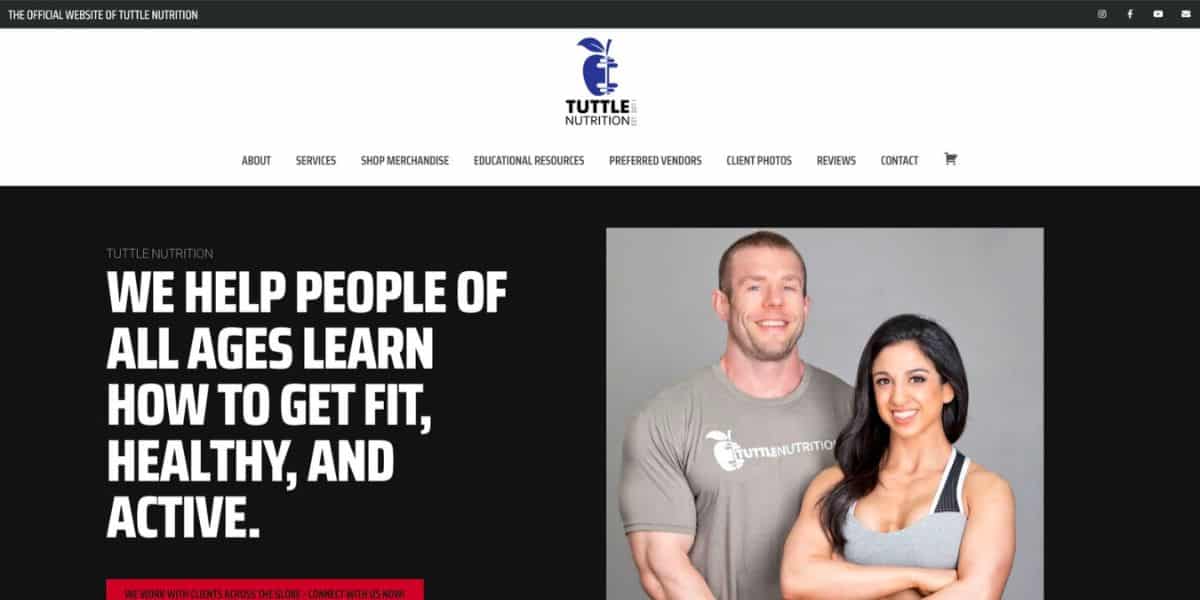
If you are a fitness enthusiast or athlete, you probably know that perfecting your nutrition can often be more difficult than anything you do in the gym. When nutrition gets in the way of your progress, finding a good nutrition and fitness coach can give you the push you need to keep going.
Guided by a husband-and-wife team of bodybuilding experts, Tuttle Nutrition has established itself as one of the premier nutrition coaching services for professional and amateur bodybuilding enthusiasts. Chris Tuttle, a professional bodybuilder himself, is also a dietitian and collegiate guest lecturer who tours the country to spread his knowledge. Alexia, his wife, is an expert nutritionist and bodybuilding prep coach who has helped many clients reach their performance goals.
As a company, Tuttle Nutrition has streamlined its services to address only clients with bodybuilding goals. Their nutrition services are extensive within that specialty, and the client response has been overwhelmingly positive.
Pricing for Tuttle Nutrition's plans ranges from $300 for a one-time plan to $1,100 for a full contest preparation plan. Additionally, Tuttle Nutrition offers a range of secondary services, such as supplements and lab testing, which may benefit those aiming for peak performance.
Pros
- Affordable Pricing: As another nutrition organization with a relatively narrow focus, Tuttle Nutrition provides streamlined, specialized services at an impressively low price point.
- Excellent for Bodybuilders: The brainchild of an experienced bodybuilding couple, Tuttle Nutrition combines the extensive personal experience of its trainers with science-based data to help other bodybuilders and fitness enthusiasts.
- Run by Fitness Professionals: As fitness enthusiasts, the Tuttles are well-versed in the approach and dedication required to find top-level success in the fitness industry, making them an excellent choice for dedicated amateur and professional athletes.
Cons
- Does Not Accept Health Insurance: Although many of their packages are affordable and comprehensive compared to some competitors, Tuttle Nutrition does not currently accept health insurance. Clients may choose to submit receipts to their provider independently, but coverage is not guaranteed.
- Excludes Non-Bodybuilder Demographics: While Tuttle Nutrition offers industry-leading expertise in bodybuilding, their lack of background diversity may leave some clients feeling underserved.
Bottom Line: Although their services may be narrow in scope, the coaches at Tuttle Nutrition are some of the best in the industry for bodybuilding-related needs.
9. Culina Health

Co-founded in 2020 by Tamar Samuels and Vannessa Risetto, a pair of dietitians, Culina Health is a premium nutrition coaching service dedicated to educating clients on nutrition and healthy eating. Rather than focusing on short-term, immediate results, Vannessa and Tamar prioritize long-term lifestyle changes and steady, concrete progress.
Blending clinical, science-backed techniques with a lifetime of experience serving clients from diverse backgrounds, Culina Health welcomes clients of all knowledge levels, from novice to expert. Even though Culina's dietitians specialize in weight loss, disordered eating, and recovery from disordered eating, they have a lot of knowledge in many different areas, which makes them a good choice for anyone who values experience.
Because they believe in long-term solutions, Culina Health's coaching programs run longer than other programs in the industry, ideally for many months.
Although more expensive than some competitors, the pedigree of Culina's nutrition professionals makes them a wise investment, and ongoing supplement and lab work discounts add to the value of the company's packages. Additionally, Culina Health is in-network with most popular insurance providers, a quality that may help offset the increased cost while maintaining the high level of service provided.
Pros
- Run by Dietitians: Conceived and constructed by experienced dietitians, Culina Health prioritizes their nutritionists' backgrounds, credentials, and experience, making them a smart choice for anyone looking to hire only the most accomplished nutrition professionals.
- Compassionate Care: Nutrition coaching can be intimidating, but Culina Health’s tradition of compassionate, inclusive care helps put customers at ease and relieve stress about nutrition-related decisions.
- Focuses on Long-Term Results: Unlike some online nutrition companies which focus on short-term, immediate goals, the professionals at Culina Health prefer to improve their clients' own knowledge of health and nutrition, preparing them for a lifetime of well-being.
Cons
- Very Expensive: As a premium service, Culina Health charges premium prices. Though still a good value for those to whom money is not an issue, many of their packages fall near the top end of the pricing scale in the industry.
- More Considerable Time Investment: Alongside their focus on long-term lifestyle changes comes a need for more sessions over a greater period of time. While this consistency may be welcome for some, it can be demanding on a client's schedule and resources.
Bottom Line: Required dietitian registration, flexible scheduling, and a focus on long-term education make Culina one of the best catch-all nutrition counseling services for those simply looking to improve their general wellness.
10. Forge

Designed with the amateur athlete in mind, Forge Fitness and Nutrition Coaching offers personalized nutrition planning, exercise programs, and guidance to help push you to the next level of performance.
Unlike some services which promise extreme, often unachievable results, Forge focuses on each step to provide gradual, consistent improvements in your performance and quality of life. This measured approach to fitness and nutrition helps athletes and other active individuals build a rock-solid foundation for a lifetime of wellness.
To begin, Forge invites potential customers to undertake their free program inquiry. During this process, you’ll meet with a company representative to discuss your goals, potential hurdles you’ve experienced, and your past experience with fitness and nutrition coaching.
Then, you’ll select from one of several packages designed to fit a range of needs depending on your level of athleticism, and Forge’s nutritionists will send you your custom nutrition plan within four business days.
Although Forge primarily offers its services to amateur athletes and other active individuals, they’ve been recognized as one of the best in its niche due to its realistic approach to nutrition, focus on sustainable results, and emphasis on body-inclusive programming.
Pros
- Realistic Expectations: While some nutritionists may offer extreme claims as to the benefits of their services, Forge focuses on achievable, realistic goals to help keep you grounded and make consistent, gradual improvements.
- Registered Dietitian-Built Plans: Forge employs a team of registered dietitians to design custom-built nutrition plans that address each client’s specific needs.
- Fitness Coaching Services: Although some competitors also offer sports and fitness coaching, Forge seamlessly integrates these services into their large nutrition coaching framework.
Cons
- Does Not Accept Insurance: Perhaps because they are a fitness coaching service first, Forge does not currently accept insurance. Despite this, clients may be able to submit receipts to their provider independently, but coverage is not guaranteed.
- Lacks Services for Non-Athletes: Due to their open focus on athletic performance and highly active individuals, Forge may struggle to meet the needs of clients with other health struggles, such as ongoing illness or pregnancy-related concerns.
Bottom Line: With a focus on amateur and professional athletes, Forge is an excellent choice for active individuals looking to improve their performance. Those looking for other specialties, however, may have more luck elsewhere.
11. Amwell
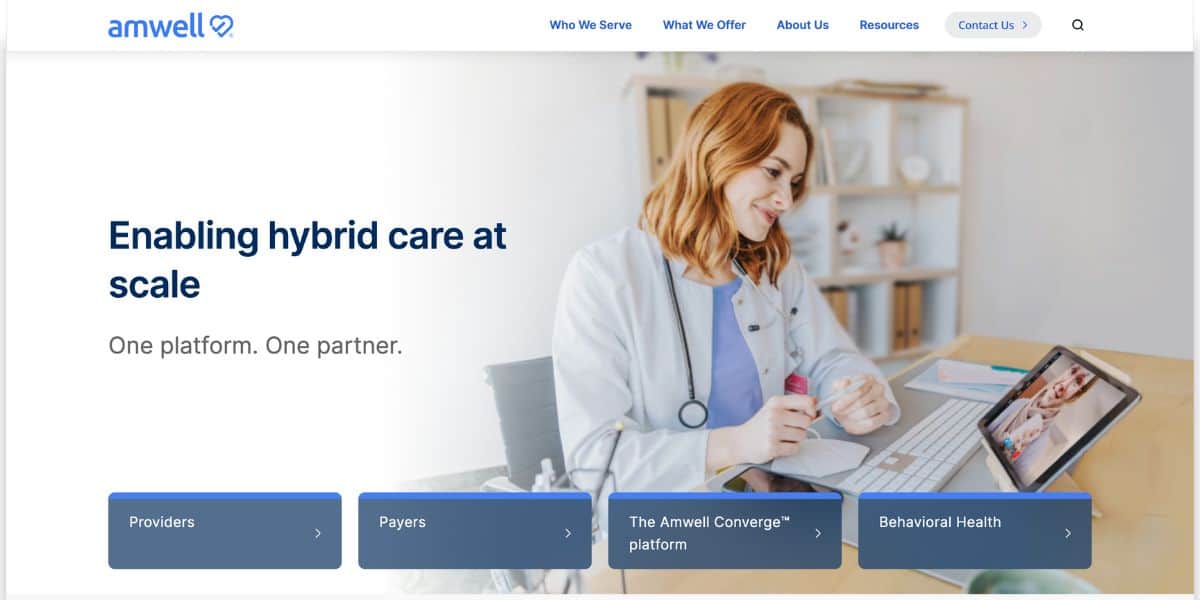
Amwell is an online service that offers support for more than fifty medical conditions, ranging from dermatological issues to mental health concerns. Unlike many other nutrition counseling services, which work with dietitians to provide care, Amwell specializes in a service known as “telehealth.” This allows the company to connect customers with licensed physicians to obtain advice, limited diagnoses, and even some prescriptions.
Despite this novel advantage over more traditional nutritionist companies, Amwell’s medical services are more limited than what you would expect from an in-person visit to your doctor. Even so, the convenience of their digital platform may be valuable for those unable to regularly attend in-person appointments and those who do not have an appropriate hospital within close proximity.
For each 30-minute session, Amwell charges customers a $79.00 fee on top of any prescriptions or secondary costs that may arise during consultation and treatment. Patients are allowed to select their preferred physician from a list on Amwell’s website and plan appointments around what works best for their schedule. While many of these physicians may provide nutrition-related advice, patients will nonetheless need to choose a nutrition expert for more in-depth counseling.
Pros
- Short, efficient sessions: Amwell’s nutrition counselors keep sessions quick and to the point, maximizing the value of each appointment while providing streamlined services to keep you on the right track.
- Physicians are specially trained for online care: In addition to their health certifications, Amwell physicians receive unique training for telehealth-specific clients.
- Users choose their nutritionist: Although some other online nutrition counseling companies assign coaches with little input, Amwell allows customers to choose which doctors they work with.
- Mobile-friendly digital platform: Available from your laptop or smartphone, Amwell’s website and communication platform are intuitive and reliable.
Cons
- Insurance coverage is unreliable: Although Amwell says that partial coverage may be possible for some customers, many customer reviews cite unreliable coverage, out-of-pocket costs for various services, and complications communicating with the company about insurance-related expenses.
- Less comprehensive care than some competitors: Due to its shorter session lengths, Amwell’s services may be less in-depth than many other competitors.
Bottom Line: Amwell is a solid, reliable company for those seeking guidance for general health-related struggles. They prioritize efficient sessions, scheduling flexibility, and intuitive technological resources to provide an easy-to-understand experience for patients. Even so, their lack of a specific focus on nutrition may be an issue for those looking for comprehensive dietary advice.
Methodology: How We Decided on the Best Online Nutritionists
Qualifications and Credentials
In nutrition coaching, only professionals that have completed a certification program can be considered a registered dietitian. They have been trained and tested, often by board-certified physicians, to make sure they offer a higher level of care than what less experienced nutritionists would offer.
Experience
There are few substitutes for experience. So, finding a nutrition specialist with sufficient experience in the areas most relevant to your needs can make all the difference. On your hunt for the right nutrition counseling service, you would likely find a match with a company that has a diverse team of specialists. Conversely, you might consider choosing a smaller, niche service that focuses on only one or two specific areas of nutrition coaching.
Approach
All of the education and experience in the world mean little if you cannot work productively with the nutrition coach. This is why we place a premium on a company's approach to online nutrition counseling. As an individual, we suggest you take a moment to decide what style of coaching or personality might motivate you best, then personalize your search for a nutrition specialist who fits that description.
Communication
Effective, consistent communication is key to growth, which is why we reviewed each nutrition coaching service by their mode of communication, customer service, and resource availability. This is because when your health is on the line, you deserve to have a clear assessment of all the details.
Personalization
Your personality is unique as are your nutrition requirements. That's why we assessed each company according to the level of personalization in their programs, pricing, and scheduling. Health and nutrition are stressful enough; you deserve coaching tailored to you.
Support
Although nutrition coaches are the front line in your effort to live a healthier life, competent and compassionate staff are often the primary factor in the results you see. We evaluated these companies not only on the strengths and weaknesses of their nutritionists but also on the quality of their customer service..
Cost
It's borderline impossible to put an accurate price tag on your health. Even so, we conducted a value-based survey on each company, their pricing and packages, and how that data relates to the industry as a whole. That way, you can be sure you're getting the most value possible for your money without sacrificing quality.
What is an Online Nutritionist?
An online nutritionist is a health professional with a background in one or more nutrition specialties that is dedicated to helping clients improve their lives through better nutrition. Depending on their area of expertise and level of experience, a nutrition coach creates meal plans, provides advice on how to deal with a chronic illness or ailment, or help a client recover from an eating disorder.
Previously, this type of nutrition counseling required individuals to meet in person with their nutrition coach when an appointment is available. Fortunately, online nutrition counseling is becoming increasingly popular, which is making services easier to access online.
Those looking for mentoring on fitness and nutrition can find an expert online nutritionist and meet with them from the comfort of their own home. For those with decreased mobility, a chronic illness, or a demanding schedule, online coaching services can often mean the difference between success and failure when dealing with weight loss goals or nutrition-related medical issues.
Not all online nutrition coaching services are created equal. Whether it's specialization, a preferred method of communication, or sufficient insurance coverage, it’s important to choose the best online nutritionists company for your unique situation.
Are you simply looking for nutrition advice and delicious, easy-to-prepare meal planning? Has your primary care doctor suggested medical nutrition therapy to manage your diabetes? Do you need help with eating disorder recovery, and if so, do you want a nutrition coach willing to coordinate with a mental health professional to provide care? Each situation requires a different kind of care, so the best online nutrition coach will create a plan tailored to your situation. To help you choose wisely, we've carefully reviewed the best online nutrition coaches of 2023, laid out their strengths, and given you the bottom line for our favorite companies.
Who Can Benefit From Working with an Online Nutritionist?
Anyone with nutrition-related health concerns or fitness goals can benefit from nutrition coaching. No matter your age, gender, level of fitness, or medical history, finding an expert to help you navigate the complicated and often confusing discipline of nutrition will reduce your stress, increase your chances of success, and teach you valuable lessons.
There are even more benefits with online nutrition coaching. In addition to saving yourself time from commuting to in-person sessions, you also receive:
- A wide range of specialists: By working with an online service, you increase the services available. No matter where you are, you can find the perfect specialist to meet your needs online.
- Flexible scheduling: You're busy, and sometimes short meeting windows aren’t realistic. With online coaching, you can find a nutrition professional to work around your schedule.
- Online resources: Videos, recipe libraries and user-friendly apps are just some of the invaluable resources you can access through online nutrition counseling.
How to Choose the Best Online Nutritionist Programs
Use this short-and-sweet checklist when deciding which nutritionist is suitable for you.
1. Determine Your Personal Goals
Before you begin choosing the best online nutritionists for your needs, sit down and take a moment to write out your hopes and goals for your health and wellness journey. For some, this may be as simple as signing up for personal training and cutting out sugar For others, it may mean a specific, goal-oriented approach to managing a chronic disease or condition. Knowing precisely what you need can help ensure best results.
2. Research the Best Online Nutrition Coaching Providers
Even if a specific online nutrition coach seems knowledgeable and trustworthy, you should still look into the coaching company and platform. Different companies will offer various service specialties, communication styles, and price points. Figuring this out before you decide on a coach will save you time, effort, and potential headaches.
3. Evaluate Their Qualifications
To be considered a credible nutrition industry professional, a coach will generally need to have earned at least one bachelor's degree in a dietetics-related field and any of the various certifications related to nutrition coaching.
The best online nutritionists will be someone with a high degree of education and training as well as experience in the specialty most relevant to your needs. Research these ahead of time to ensure you find the perfect match.
4. Assess Their Approach
After getting a feel for your potential coach's qualifications, experience, and specialty, all that's left is to assess their approach, or how they interact with their clients. Depending on your personality, you may benefit from a more direct, personal-training-style approach. Conversely, you may prefer working with someone who lets you move at your own speed and prioritizes your comfort above all else.
5. Availability and Support
Sometimes, even the best online nutrition coach for your situation may be unavailable due to overbooking or administrative issues. Make sure that whichever company you select also maintains a team of support professionals to facilitate scheduling, communication, and payment.
Finding your way to better health is a team effort. And, while you and your coach are the star players, a solid support staff can make all the difference in whether you succeed or fail in your mission for better health.
6. Compare Pricing
Even if an online nutritionist has outstanding credentials and the perfect coaching style for your personality, there's still one final factor to consider: cost.
Nutrition counseling is a valuable way to improve your health, but we also acknowledge that cost is an important factor. Finding a company that has flexible pricing, accepts insurance, and allows you to schedule only the number of sessions you want can help ease stress and allow you to focus on what matters most: your health.
7. Schedule a Consultation
Once you've conducted research, completed all these steps, and decided on the right online nutrition counseling for your needs, the next step is scheduling a consultation. Often, these introductory sessions will be complimentary and serve as onboarding to introduce you to your new coach.
How to Find the Best Online Nutrition Coach for You
If you've decided to be proactive about improving your health, losing weight, or reducing your risk of heart disease, one of the best things you can do is develop healthy eating habits. You probably know the basics, like reducing sweets and eating more veggies, but it often takes a lot of work to turn these generic suggestions into sustainable lifestyle changes. Here are a few baseline things that you should know.
The best online nutrition coach is a highly qualified expert who can help you make real strides toward your health goals. Even if your doctor has provided you with some good advice, there are significant advantages to hiring a nutrition expert. Dietitians and certified nutrition specialists are the most advanced certifications for personalized nutrition practitioners. Every registered dietitian has at least a bachelor's degree in nutrition, hundreds of hours of supervised practical experience, and has passed a board-certifying exam. An experienced nutritionist can develop a customized plan for your unique challenges and goals. Plus, they can give you the encouragement and support that are the keys to long-term success for many people.
Finding the Right Online Nutritionist for Your Needs
While some online nutritionists practice providing general nutrition education and advice, many specialize in a certain area of expertise. The Top Nutrition Coaching network includes experts in many different nutrition fields; some specialize in sports nutrition or pediatric nutrition, others in very niche categories like renal or heart health. Meanwhile, other nutritionists may have specialties in creating healthy eating habits to rectify nutrition gaps, especially for those who are vegan or gluten-free. However, all nutritionists have one thing in common: a passion for helping people improve their health and wellness through diet and nutrition.
Weight Loss
Human nutrition is a complex and personal subject, and many people have difficulty losing weight even when they understand the basics of being in a caloric deficit. When influencers, diet companies, personal trainers, and healthcare professionals dispense contradictory messages about weight management, it can be hard to know who to trust.
Maintaining a healthy weight is incredibly personal, and what works for one person may not be suitable for another. One of the benefits of working with a weight loss nutritionist is their ability to provide a personalized nutrition program that factors in your unique needs, goals, and lifestyle to help you create sustainable habits for long-term success.
Sports and Athletics
Your eating habits can significantly affect your body's ability to perform well in sports and athletics. Nutrition can also affect your recovery times.
Even if you're working with a personal trainer, they may not have the education and knowledge to provide more than generic meal plans or tips about eating enough protein. Finding online personal training from a nutritionist who specializes in working with athletes can help you understand what your body needs to stay hydrated and nourished so you can train and recover well. If that's your goal, then you're looking for the best sports nutritionist near you.
Prenatal and Postpartum
With all the physical, mental, and emotional side effects of pregnancy and postpartum, it's difficult for many women to know how to eat healthily. Eating well can be especially hard if you have nausea, cravings, or food aversions. If you're having difficulty maintaining a healthy weight, a pregnancy nutritionist near you can offer personalized suggestions that incorporate your unique health concerns and goals.
Heart Health
Your diet can affect your blood pressure, cholesterol, and weight, all of which can make your body more or less susceptible to cardiovascular disease. If your doctor is concerned about your cholesterol or high blood pressure, hiring a heart health nutritionist can help you learn how to build meals around foods that are good for your cardiovascular system.
GI and Gut Health
Crohn's disease, irritable bowel syndrome, and leaky gut are some of the GI issues affecting many people. All of these conditions can have uncomfortable side effects and long-term health risks. By choosing a nutritionist specializing in GI issues and gut health, you can learn how to modify your eating habits to manage your condition and feel better overall.
Pediatric
Nutrition can be hard for kids with food allergies, sensitivity to textures, health problems, or who might have an eating disorder. It can be extremely stressful for parents who want to care for their child's health but don't know how. Many parents work with medical professionals to help take care of their child's illness, but these experts may not be able to give much more than basic advice on how to feed your child well.
A pediatric nutritionist has specialized training in the unique challenges that affect young children and their parents. They can help you understand the possible causes of your child's food sensitivities or symptoms, develop a plan to introduce new foods to your child, and help them develop a balanced diet.
Renal
Eating and lifestyle habits can help you manage the slow progression of your chronic disease. Still, your doctor may be unable to offer you ongoing support and personalized activity and meal plans. With an expert renal dietitian, you can better understand how your choices affect your condition and get the encouragement you need to maintain proper nutrition.
Diabetes
Type 1 and type 2 diabetes require patients to closely watch their nutrition and key health stats, such as blood sugar and cholesterol. A diabetes nutritionist can help individuals at any stage of the disease, including prediabetes. If you aren't sure how to change your diet to manage your condition, a diabetes nutritionist can offer the expertise you need.
Am I a Good Candidate to Work With an Online Nutritionist?
Food is fuel for your brain and body. Incorporating healthy foods with vitamins, minerals, and other nutrients into your diet can help you ward off long-term disease, lose weight, lower your blood pressure, and boost your energy and emotional health. It's important to remember that nutrition is more than merely counting calories; it's a complex science that varies from person to person. Whether you are managing a chronic disease or need guidance navigating food allergies or weight gain, a dietitian can provide you with a personalized nutrition plan to suit your circumstances. Here are a few examples of cases where a qualified nutritionist can be the key to success.
You have food sensitivities or allergies
How can you build a healthy diet around gluten sensitivity? What should you do if you can't stand eating veggies? Talk with a dietitian who specializes in gut health and GI issues. They'll design custom meal plans that factor in your sensitivities and help sustain your healthy new habits for life.
You want to train for an athletic event
Are you training for a marathon or starting a yoga practice? Talk to a sports nutritionist. With experience in fitness and nutrition coaching, they can help you understand how to modify your diet to give your body the fuel it needs to perform and recover well.
You want to lose weight but have a history of eating disorders
If you have an eating disorder, it's imperative to approach calorie tracking cautiously to avoid falling back into those dangerous habits. Look for a dietitian who specializes in assisting individuals with eating disorder recovery. They can help you understand your triggers and give you small, practical steps to improve your relationship with food and your overall mental health and stress levels.
You want to manage your weight while breastfeeding
Breastfeeding is difficult for many women, and weight fluctuations are a common side effect. Talk with a postpartum nutritionist if you are struggling with your weight and don't want to endanger your milk supply. They thoroughly understand the relationship between breastfeeding and nutrition, so they can help you learn how to eat in a way that supports lactation and a healthy weight.
Your child is an unhealthy weight
Childhood obesity is prevalent in the United States. If your child is overweight or underweight, immediately addressing the problem is essential to prevent long-term health issues and mental illness. Many children receive unhealthy messages about body image and dangerous diet tips from social media and pop culture. A pediatric nutritionist can work with you and your child to provide encouragement and support along with safe, science-backed meal plans for sustainable weight loss.
Your doctor has suggested medical nutrition therapy to manage diabetes or prediabetes
It can be scary to hear that you have prediabetes, but the good news is that this condition is reversible. To prevent getting diabetes, you must make significant lifestyle changes and maintain those new habits forever.
A diabetes nutritionist can provide medical nutrition therapy to reverse prediabetes. With an expert, you can understand how your current eating and lifestyle choices contribute to prediabetes and get a realistic plan to develop healthier habits.
You have chronic kidney disease
The symptoms of chronic kidney disease can be devastating. Your doctor and healthcare team can offer basic information on how your diet affects your CKD symptoms, but sustainable progress toward better health requires a detailed, personalized approach. A renal nutritionist can give you the necessary tools to address your unique condition, whether that's kidney stones, an acute kidney injury, or cancer.
You have a high risk of cardiovascular disease
High blood pressure and high cholesterol increase the risk of heart attack and stroke. Your weight can also affect your cardiovascular health.
A heart-health nutritionist can do more than help you build healthier meals and schedule more activities during your days. They can also look at how your sleep patterns and stress affect your blood pressure and cholesterol and give you practical tips for improving those areas of your life.
FAQ on Best Online Nutritionists
What should I look for when choosing the best online nutritionist?
When selecting an online nutritionist, prioritize credentials such as a registered dietitian (RD) or a certified nutrition specialist (CNS). Experience in your specific health needs, such as weight management or sports nutrition, is also crucial. Look for positive client testimonials and a personalized approach to diet planning. Ensure they offer convenient communication methods and ongoing support. According to the Academy of Nutrition and Dietetics, verifying the nutritionist's licensure and qualifications is essential for ensuring credible advice.
How effective are online nutritionists compared to in-person consultations?
Online nutritionists can be just as effective as in-person consultations, offering the same level of personalized advice and support. A study published in the Journal of the Academy of Nutrition and Dietetics found that telehealth nutrition services are effective for weight loss and improving diet quality. The convenience of online sessions can also lead to better adherence and more consistent follow-up, which is key for long-term success.
Can online nutritionists help with medical conditions like diabetes or heart disease?
Yes, many online nutritionists specialize in managing chronic conditions such as diabetes or heart disease. They can provide tailored meal plans, education on nutrient impact, and strategies to manage blood sugar or cholesterol levels. The American Diabetes Association recognizes the importance of medical nutrition therapy in diabetes care, which can be effectively delivered through online platforms by qualified professionals.
What is the typical cost of consulting with an online nutritionist?
The cost of consulting with an online nutritionist varies widely based on their expertise, the length and frequency of sessions, and whether they offer package deals. Prices can range from $50 to $200 per session. Some may offer monthly subscriptions or bundled services, which can reduce the overall cost. It's important to check if your health insurance provides coverage for nutrition counseling, as this can significantly offset expenses.
Are there any free or low-cost resources for nutrition advice online?
For those seeking free or low-cost nutrition advice, numerous reputable sources are available. Websites like ChooseMyPlate.gov provide free dietary guidelines and meal planning tools. Additionally, many non-profit organizations and health clinics offer free educational materials and access to registered dietitians for low-income individuals. Local community centers and libraries may also host free nutrition workshops or seminars led by nutrition professionals.
What are nutrients and how an online nutritionist can help?
Nutrients are essential chemical compounds, including fats, minerals, carbohydrates, vitamins, and water, vital for survival, growth, and the maintenance of body processes. Macronutrients like fats, carbohydrates, and proteins are needed in large amounts for energy, tissue repair, and normal brain function, while micronutrients, required in smaller amounts, include various vitamins and minerals crucial for health. Online nutritionists play a key role in guiding individuals to understand their nutritional needs, ensuring a balanced intake of these essential nutrients to prevent deficiencies and maintain optimal health. They customize dietary plans to include a diverse range of foods rich in essential micronutrients and macronutrients, leveraging their expertise to address specific health conditions and wellness goals.

Lena Bakovic is a Certified Nutrition Support Clinician (CNSC) and a Registered Dietitian Nutritionist (RDN). She uses her expertise to provide easy-to-follow, science-backed nutrition advice, helping people lead healthier lives.

VNutrition & Wellness’ Annual LGBTQ+ Vitality Scholarship
The LGBTQ+ Vitality Scholarship is a recurring scholarship open to all students who are part of the LGBTQ+ community and pursuing higher education. The next deadline to apply is July 1, and winners will be announced on July 30.
Scholarship Award: $500
About the LGBTQ+ Vitality Scholarship
Scholarship award available for both college and high school students.
The LGBTQ+ Vitality Scholarship is designed to support LGBTQ+ individuals pursuing academic goals while promoting their overall health and well-being. LGBTQ+ students face unique challenges, and we want to empower them as they focus on higher education.
At VNutrition and Wellness, we understand that LGBTQ+ individuals often encounter distinct obstacles that can impact their mental, emotional, and physical well-being, on top of the stressors that naturally come with school. Discrimination, social stigma, and a lack of access to proper resources are just a few examples of the challenges faced by the LGBTQ+ community, and we are dedicated to providing support and opportunities for LGBTQ+ individuals so they can reach their full potential and flourish in college.
We believe that education is a powerful tool for personal growth and creating positive change. By investing in the academic journey of LGBTQ+ individuals, we hope to empower a generation of LGBTQ+ leaders to find personal and professional fulfillment, and who will contribute to a more inclusive and equitable society.
Scholarship Details
- Amount: $500
- Application deadline: July 1
- Winner Announcement Date: July 30
- Recurring: Annually
Eligibility Requirements
To qualify for this scholarship, please carefully review the following eligibility criteria. Ensure you meet these requirements prior to submitting your application.
- Identifies as LGBTQ+
- All high school seniors, undergraduate students, or graduate students
- Applicant must be a current U.S. citizen or permanent legal resident
How to Apply
You can apply for this scholarship on the Bold.org scholarship platform. Follow the directions and submit your application for the LGBTQ+ Vitality Scholarship, along with a short essay answering the following prompt:
"How do you plan to use your education to make a positive impact on society?"
A Trusted Choice Among Universities
Scholarship Frequently Asked Questions
When is the scholarship deadline?
The application will be open through July 1.
What is the scholarship prize?
The scholarship award is $500.
When will the winner be chosen and notified?
Prior to the announcement date, we may contact finalists with additional questions about their applications. Recipients will be chosen based on the merit of their applications.
How will the scholarship be paid?
The prize check will be sent to the scholarship winner’s college institution in their name and in the name of their institution (depending on the school’s requirements).
Is this a recurring scholarship?
Yes, the LGBTQ+ Vitality Scholarship is an annual scholarship.
How will my scholarship application be verified?
Before we award the scholarship, the winner will be required to verify their academic enrollment status by providing a copy of their most recent transcript.
How can I get in touch with questions?
If you have any questions about this scholarship, email [email protected] and we will get back to you as quickly as we can.
How will my application information be used?
VNutrition and Wellness manages this scholarship with the support of the Bold.org scholarship platform. Bold.org takes student confidentiality and privacy incredibly seriously. Please refer to the application page on Bold.org for full details.
About VNutrition and Wellness
At VNutrition and Wellness, we know that eating healthy can feel restrictive and boring. Our approach to healthy eating focuses on nourishing our bodies without feeling limited by meal choices. We create realistic recipes that are easy to make and tasty so you don’t have to feel limited by typical “diet” foods and can enjoy what you eat while getting all of the nutrients your body needs!

Lena Bakovic is a Certified Nutrition Support Clinician (CNSC) and a Registered Dietitian Nutritionist (RDN). She uses her expertise to provide easy-to-follow, science-backed nutrition advice, helping people lead healthier lives.
Leave a Reply